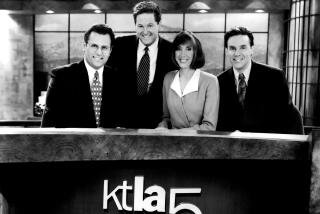Herb Brin, 87; Poet, Jewish Activist Founded Chain of 4 Heritage Papers
- Share via
How a journalist, how an editor could also be a brilliant poet ... is a source of astonishment -- and of gratitude.
Nobel laureate Elie Wiesel
on “Poems From the Rubio”
by Herb Brin
*
Herb Brin, poet, crusader and newsman who owned and operated the now-defunct Los Angeles Jewish newspaper Heritage from 1954 until he closed it in 2001, has died. He was 87.
Brin died last Thursday of congestive heart failure at the Jewish Home for the Aging in Reseda, said his son, Daniel Brin.
Besides “Poems From the Rubio” praised by Elie Wiesel, Herb Brin wrote five other volumes of poetry: “Wild Flowers,” “Justice-Justice,” “Conflicts,” “My Spanish Years and Other Poems” and “Nobody Died Laughing.”
In two grim travelogues of prose, “Ich Bin Ein Jude [I Am A Jew]” and “Where Are the Children?” the versatile Brin took readers to Holocaust death camps and questioned how Germany, which calls itself “the nation of poets and thinkers,” could permit Hitler to murder 6 million Jews.
“His verses are the cry, the laughter, the little sorrows and the eternal triumphs of a man -- and of a people whose poets have celebrated her history and faith for 4,000 years,” Brin’s son David, a science fiction novelist, said on his Web site.
Whether Herb Brin was writing poetry, editorials, softhearted features, hard-hitting exposes or placard slogans for protest marches, he was always crusading for what he thought was best for his people. But his outspoken rhetoric -- and the problems he sought to publicize, such as exclusion of welfare patients by Cedars-Sinai Medical Center -- sometimes put him at odds with the establishment.
An experienced newsman, Brin was determined to broaden his personal crusade against anti-Semitism. In 1954, he mortgaged his house and launched a small chain of four weekly Jewish papers he named Heritage -- the largest in Los Angeles, one in the Central Valley, another in Orange County and one in San Diego. Only the San Diego edition remains, under new management and with Brin’s son Daniel as senior associate editor.
The elder Brin served as publisher and editor until 1979, when he designated himself editor emeritus, yielding to Daniel Brin as his replacement. But the publisher never left his typewriter.
He printed investigative stories about American Nazi Party leader George Lincoln Rockwell, and Willis Carto, founder of the Institute for Historical Review, which has claimed the Holocaust never happened. In his 70s, Brin drove to Hayden Lake, Idaho, and -- making it clear that he was a Jewish journalist -- demanded a tour of the grounds of the Aryan Nations compound. He got the tour, and wrote about it for his newspapers.
Remarkably, Brin brought to light the story that became known as “Schindler’s List” in his Heritage weekly, circulation 13,500. He interviewed a Holocaust survivor named Leopold Page, whom he met through a local rabbi, and wrote Page’s remembrances of a German industrialist named Oskar Schindler who protected Jews during the Holocaust. Australian writer Thomas Keneally saw a copy of the article Page had placed on the wall of his Beverly Hills luggage store, and began to research and write the book that Steven Spielberg later turned into his Academy Award-winning film.
Never one to be categorized politically, Brin primarily supported Democratic candidates -- Robert F. Kennedy, George McGovern, Los Angeles four-term Mayor Tom Bradley, and especially Sens. Diane Feinstein and Barbara Boxer. But he also campaigned against reelection of Jimmy Carter, opposed the Vietnam War, waged predominantly by Democratic administrations, and worked for passage of conservative Howard Jarvis’ Proposition 13.
In less emotionally charged newspaper crusades, he worked for a Santa Monica Mountains park and forced the esteemed Michelin Guide to reinstate Jerusalem and Tel Aviv on a key Middle East map.
Brin’s longest and last major battle was with the Jewish Federation Council of Greater Los Angeles, which coordinates Jewish charities. And that one brought him down.
With fiery typewriter, a $1.4-million lawsuit that went nowhere and demonstrations outside the federation’s offices, Brin railed that the group’s subsidy of what became the Jewish Journal was meant to put his and other independent Jewish newspapers out of business.
For more than 15 years, Brin fought losses in advertising revenue that moved to the far larger 75,000-circulation Journal. In 2001, he reluctantly folded his Los Angeles paper and two others and relinquished management of the remaining one in San Diego.
The Chicago-born son of a Polish Jewish immigrant father, Brin attended Crane Junior College, DePaul University and the University of Chicago.
He enlisted in the Army after Pearl Harbor -- only to break both feet in a training accident. He wound up spending the war writing for Yank magazine.
Brin reported on gangland corruption for Chicago’s fabled City News Service in the 1930s and from 1947 to 1954 was a top feature writer for The Los Angeles Times whose stories included the final departure of Charlie Chaplin from Union Station for Europe.
He had recently completed his autobiography, “Shouting for Justice.”
Married and divorced three times, in addition to sons Daniel of West Hills and David of San Diego, he is survived by a third son, Stan, a business writer in Orange County; and six grandchildren.
More to Read
Sign up for our Book Club newsletter
Get the latest news, events and more from the Los Angeles Times Book Club, and help us get L.A. reading and talking.
You may occasionally receive promotional content from the Los Angeles Times.










